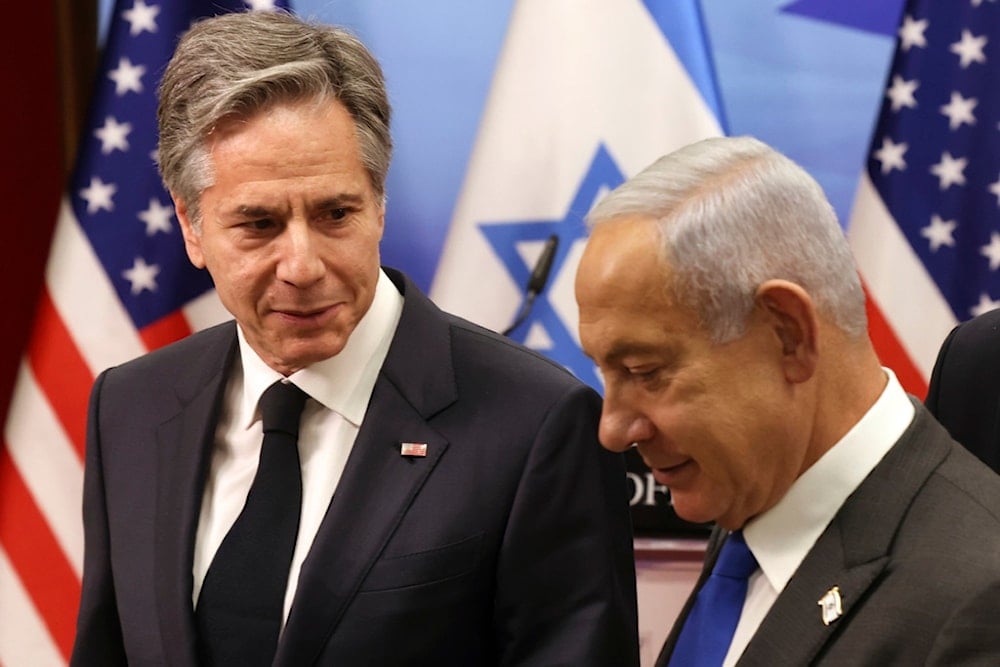US backs Israeli approach to Philadelphi Corridor: Israeli official
Israeli media reported that an official with knowledge of the meeting between US and Israeli occupation officials explained that "Israel’s" withdrawal from the Gaza-Egypt border without achieving its goal of removing Hamas would project weakness across the region.
-

US Secretary of State Antony Blinken and Israeli occupation Prime Minister Benjamin Netanyahu give a joint press conference, on Monday, January 30, 2023, in al-Quds, occupied Palestine. (AP)
"The Americans did not reject Israel’s strategic logic," according to a report by The Times of Israel citing an official familiar with the meeting that was held between Israeli occupation Prime Minister Benjamin Netanyahu and US Secretary of State Anthony Blinken earlier tonight.
According to the report, "Israel" argued that they will not leave the Philadelphi Route, not completely, because Tel Aviv "cannot be sure that we can go back" as international pressure mounts.
The cited official also reportedly noted that Washington, through Blinken, accepted the Israeli occupation's approach regarding the Philadelphi Route while stressing that efforts to protect "Israel" and its security interests will continue throughout the upcoming week.
The official compares the current defense attitude—“we will know how to deal with” any threats from Hamas if "Israel" withdraws from the Gaza-Egypt border—to similar viewpoints seen during the Oslo peace process in the 1990s, the 2005 disengagement, and the agreement that concluded the 2006 Second Lebanon War or the “Hamas is deterred” strategy.
Moreover, the report quoted the official saying that "the prime minister assesses that Iran will try to attack Israel anyway," claiming, that "Iran is interested in the end of the war so Hamas will survive."
According to Israeli media's report, the official argued that if "Israel" agreed to end the war on the Gaza Strip without achieving its objective of "removing Hamas", it would project a sense of weakness across the region and "that is the last thing Israel should do at this time."
Arab mediators: Egypt insists on Israel’s withdrawal from Rafah crossing
Al-Qahera TV quoted a high-level source as saying that Egypt "renews its commitment to the complete Israeli withdrawal from the Rafah crossing and the Philadelphi corridor."
In the same context, The Wall Street Journal quoted Arab mediators as saying that an Israeli technical team concluded its meetings with its counterparts in Cairo to discuss the issues of the Philadelphi Corridor and the Rafah border crossing without making any significant progress.
According to these mediators, Hamas political bureau chief Yahya Sinwar “believes that the latest round of talks is a ploy aimed at giving Israel more time to launch its military campaign.”
Arab mediators said, according to the newspaper, that "Israel" seeks to build a wall on the Philadelphi Corridor, and wants access to the broadcasts of cameras and sensors that monitor the area.
Blinken to head to Egypt, Qatar, after adopting Netanyahu Proposal
Following discussions with the Israeli occupation on Monday, US Secretary of State Antony Blinken said that he will fly to Egypt and Qatar to confer with their leaders on the procedures needed to achieve Hamas' support for the recent bridging proposal on a Gaza truce.
Blinken told the press that he looks forward to "consulting with President el-Sisi, with the Emir Sheikh Tamim, with other critical colleagues in both countries on the immediate steps ahead, and in particular, what needs to be done.
After agreeing to the Israeli proposal which the Resistance labeled as a full submission, Blinken said Hamas needed to accept it. He said that the next critical step is for Hamas to agree to the ceasefire plan, after which negotiators would hash out the terms of the agreement "to ensure that Hamas comes along."
He described Washington's recent alleged efforts for the establishment of a ceasefire in the Gaza Strip as "probably the best, maybe the last opportunity", calling on all parties to allow the finalization of the deal.
Ahead of his meeting with the Israeli occupation's president, Isaac Herzog, Blinken told reporters that the upcoming round of talks is a "decisive moment" and potentially the last opportunity to return the captives and implement a ceasefire "to put everyone on a better path to enduring peace and security."
"It is time for everyone to get to yes and to not look for any excuses to say no," he added.
A Palestinian source involved in the negotiations revealed to Al Mayadeen details of a new US proposal for a ceasefire in Gaza and a prisoner exchange, emphasizing that it “completely contradicts the agreement that both parties had previously accepted.”
According to the Palestinian source, the new American proposal "builds on the May framework but has been adjusted to accommodate and align with the latest Israeli conditions and demands."
The source further explained to Al Mayadeen that, regarding the ceasefire, the US proposal “does not call for a permanent ceasefire.” Instead, the ceasefire is being discussed as part of a second phase with a clearly defined time limit.
The source highlighted that the US proposal emphasizes that “unless Hamas agrees to the Israeli demands, the occupation will resume military operations in the second phase.”
He also stressed that the proposal "does not include a comprehensive
Read more: Hamas responds to ceasefire proposal, blames Netanyahu for stalling

 5 Min Read
5 Min Read








